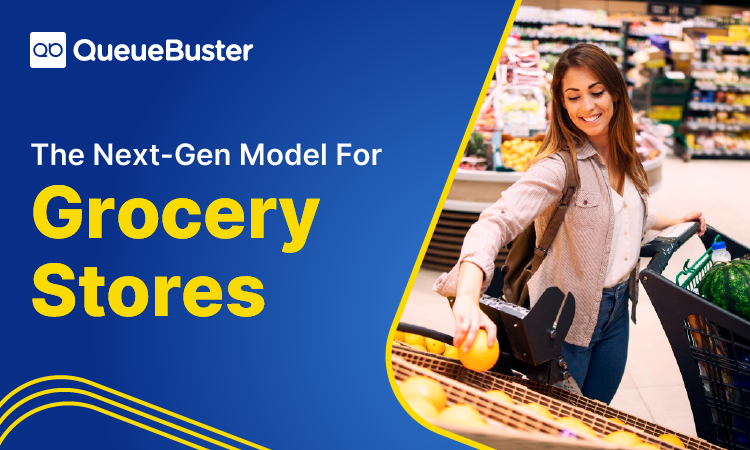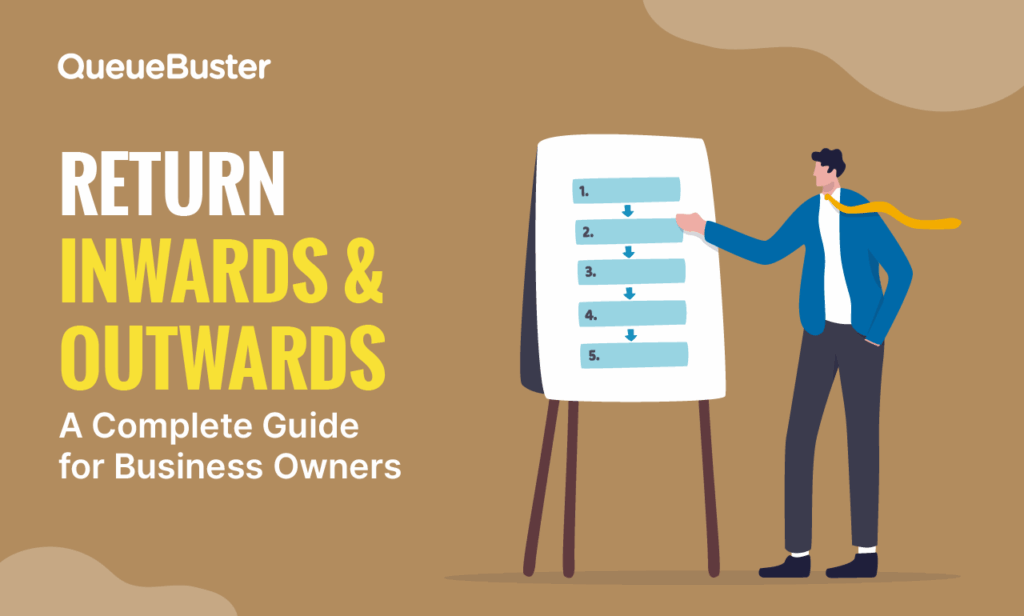
The Next-Gen POS Billing Software Model for Grocery Stores
The Next-Gen POS Billing Software Model for Grocery Stores

By QueueBuster Team Published: November 23rd, 2023
In this blog, we will be touching upon the way the grocery POS billing software model should and will operate in 2024, known as the Next-Gen model for Grocery Stores.
After fighting the pandemic for more than two years the world has recovered and is functioning better than it did before the pandemic time. The way consumers used to purchase their daily needs items has changed. Retailers are being driven by these shifts as more sales and profitability flow in.
Overview About Grocery Retail Business
Companies are now experimenting with new business models and technology for long-term growth and improved user experiences. The effect of the changes on brands and companies in the future has been discussed in various news media. As discussed the key behavioural shifts we have seen were ‘online shopping patterns’ and ‘adapting to work from home’.
E-commerce helped millions of Indians freely and easily buy hygiene items, critical commodities, and food safety. This sector has continued to expand rapidly and offers strong value propositions like convenience, variety, accessibility, and affordability. Grocery has emerged as a fast-growing e-commerce industry in the last year, with significant potential for additional growth.
Reasons for E-grocery Services’ Rising Popularity
Online grocery shopping has grown in popularity due to a variety of factors. There is a renewed emphasis on cleanliness and safety, changing lifestyles. Today’s tech-savvy generation of buyers prefers the ease of buying things online. With the work-from-home model getting popularity, people have adopted ordering groceries online from their favourite local stores.
Today’s e-grocery services include everyday basics, home supplies, fresh vegetables and fruits, drinks and snacks, spices, personal care, confectionery, and other items. It becomes important for owners to maintain their inventory, keeping the shelf life of each item in mind. For making grocery store owners’ life easier, QueueBuster offers POS for grocery stores to manage inventories.
Apart from that if you don’t have an online presence QBuster offers an e-dukaan feature which is an online dukaan builder that offers built-in templates and web design tools for creating a website from the ground up. Here you also get a variety of functions and extensions to make your online store more user-friendly and bring your store online.
Accessibility, Inclusion, Affordability, and Trust
The first thing that comes to mind for operating a grocery store in 2023 is accessibility. From both, the owner’s and consumers’ perspectives, items in grocery stores should be accessible to a wide range of potential customers. A customer should be well aware of the items that a store is selling and all the details associated with them. To maintain the standard of this accessibility for its consumers, owners should incorporate grocery business management software.
The second important thing is Inclusion. In a society as culturally and socially varied as ours, inclusion is critical. Grocery store owners or large companies operating in this sector had to ensure economically viable options for their stores. So it becomes important to cover vernacular-language interfaces for their applications or products to make them more accessible and relevant across regions.
The third benefit is affordability. To make shopping more economical and payments simpler, e-grocery platforms and grocery store management software provide payment structures. These include options such as the ‘Buy Now Pay Later.’ This option allows buyers to settle the bill later using the payment mode of their choice. Increasing the affordability of products brings more customers and thus more sales.
Error: Contact form not found.
In the end, it comes down to trust. Grocery stores or e-grocery, like any new service, should try to gain customer confidence. In 2023, one way this can be accomplished is via new technologies such as open-box delivery which allows buyers to inspect things immediately.
Don’t forget all of these options can be done well, but before setting them up, grocery stores should be equipped with the right tools. An example is the Grocery POS Billing Software that can lend the business full control of the inventory. Once the grocery shop management software is in place, everything else will follow.
Role of Technology for Grocery Stores
Technology plays a major role in facilitating efficient, smooth, and trouble-free supply chain operations. Intelligent systems and automation technology are now providing strong, seamless supply chains with a smooth product and service flow. Integrating technology into critical operations such as sorting at mother hubs, warehouse dispatch, coordinating local runs, and beat planning help the fulfilment process be controlled with little human involvement.
Assembling, sorting and packing have all become more efficient and precise thanks to automated storage retrieval systems. E-grocery players optimize the delivery process with the help of intelligent systems. They use geocodes to plot delivery addresses on a map; data-backed planning, the sequence of deliveries of items to be packed together to ensure a quick delivery. Moreover, planning engines determine the number of orders in each delivery van.
There are other dashboards accessible for monitoring all orders. Stringent inspections help verify the integrity of all packaging and items at different stages.
Future of Grocery Stores
Future development and progress will be guided by Innovation and Sustainability. The future presents enormous opportunities and development opportunities for Indian e-grocery businesses. A growing number of offline retail businesses, particularly kiranas, are experimenting with digital and omnichannel solutions to better serve their consumers.
This might pave the way for collaborations between online and traditional supermarkets. Meanwhile, as the emphasis on sustainability grows stronger, e-grocery players seek to implement sustainability measures at every level, from the farm to the doorstep.
Energy-and resource-efficient processes, green infrastructure, electric transportation, water and waste management, sustainable packaging, environmentally friendly cold chains, green certifications, and other initiatives are examples. Customers will continue to seek internet platforms for their grocery requirements even when life returns to a pre-pandemic routine.
According to current trends, the demand for nutritional and fresh meals, drinks, and easy-to-cook items might skyrocket. For continuous development and success, e-grocers must be nimble in adjusting their offers to capitalize on new and upcoming trends.
POS Billing Software for Grocery Stores
A strong retail grocery POS billing software is essential for grocery businesses of all sizes, from one location to a multi-location chain outlet, to grow. Using automation and digital technologies, grocery management software enables businesses to increase profitability by lowering manual errors.
While businesses with many outlets use the grocery POS app to manage the supply chain between warehouses and outlets from a centralised digital platform, small grocery stores utilise it to keep up well with changing demand and supply and increase sales.
On top of regular point-of-sale (POS) software capabilities like scale and scanner integration, online grocery sales, self-checkout choices, and lot and expiry date monitoring, grocery businesses need special hardware and software solutions. These additions are normally more expensive, but small grocers may still find reasonable POS systems.
Grocery shops need a POS system that can handle huge amounts of perishable merchandise, monitor and manage personnel, and use customer relationship management (CRM) tools to foster customer loyalty. POS for grocery stores also requires long-lasting and industry-specific gear, such as scale and scanner integration possibilities. E-commerce solutions are increasingly becoming a must-have feature as customer demand for online buying grows.
QueueBuster eStore is a QueueBuster POS software extension that enables businesses to sell online, take in-store orders, provide pickup or local delivery, and collect payments digitally. With the QueueBuster eStore, any business can launch an online shop in minutes and with no technology investment.
Retail stores have a bright future ahead, with the more advanced technologies coming in the loss incurred is going low and profitability is increasing. Retail stores owner who has automated their store management will win this race. If you are also looking for an all-in-one solution place for your retail store then Schedule a demo or get in touch with the team at QueueBuster.
Error: Contact form not found.
The QueueBuster POS Software makes it easy for businesses to manage their inventory, clients, loyalty, khata, and online dukaan. It is really comprehensive and is very reasonably priced and assists firms in time and money savings. The software is really easy to use and aids businesses in making the most of their QueueBuster experience.
Popular Posts

Carbon Credit Companies in India: Driving Climate Action Through Innovation
As India accelerates toward sustainable development and net-zero targets, carbon credits are […]

Return Inwards & Outwards: Meaning & Examples
In a fast-paced world, inventory-driven market like India, managing your stock and […]